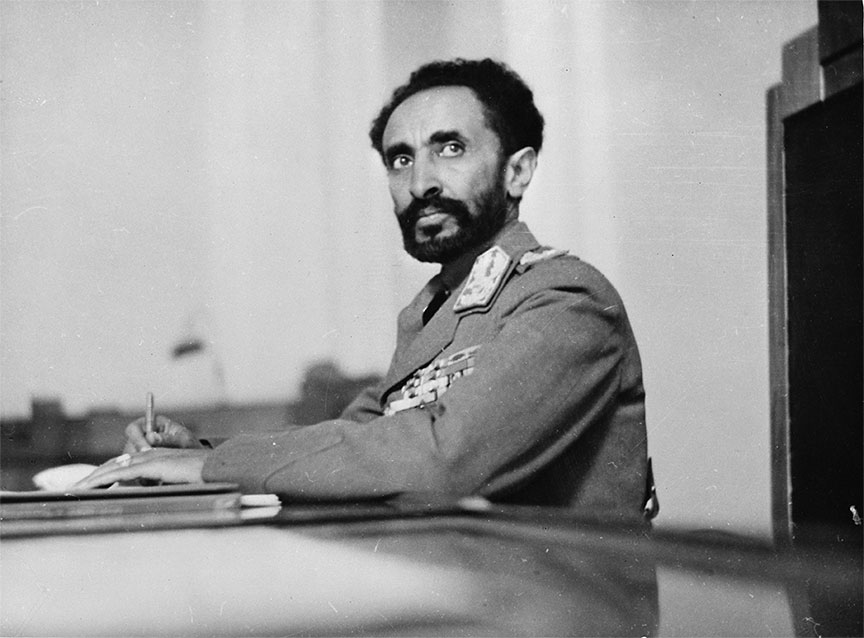Italy Invades Ethiopia
The Italians had claimed Ethiopia as their territory. With economic conditions worsening at home, Mussolini needed to take actions that would distract the Italians people. In 1936, the Italians fought against poorly-armed Ethiopian troops in Addis Ababa (Ethiopia's capital). The League of Nations censured Italy, but that comprised the extent of world reaction.
In the late 19th century, Italy developed the ambition to establish an African empire. Its first attempt ended in disaster when the Ethiopians defeated the Italian army at the Battle of Adawa. The Italians were forced to settle for Eritrea and Ethiopian Somalia.
The Italian government and the British government signed a secret agreement in 1925 recognizing Italian interests in Ethiopia and the surrounding area. In 1935 a Franco-Italian agreement gave the Italian effective carte blanche in Africa in return for France's Italian support in Europe. The Italians began transferring forces to Africa.
By the time hostilities began, there were 400,000 Italian forces in Eritrea and another 285,000 in Italian Somaliland. They were well equipped with modern weapons, including artillery and air support. On the other hand, the Ethiopians, with an army of approximately 500,000, had very few modern weapons. Many of their rifles dated from the turn of the century. At the outbreak of the war, the Ethiopian Air Force consisted of 13 obsolete aircraft.
On October 3, 1935, Italian troops stationed in Eritrea attacked. At the same time, a smaller force attacked from Italian Somaliland. On October 6, Adawa, the location of the Italian defeat in the first Italian Ethiopian war, was captured, and a few days later, Aksum was captured. The Ethiopians launched a counter-offensive on Christmas. It met with some initial success but ultimately, the superiority of Italian weapons, which included illegal chemical weapons, and the Ethiopians poor communication ability allowed the Italians the stop the Ethiopian advance.
In early March, the Italians resumed their advanced. They bombed the city of Harar on March 29. On March 31 the Italians achieved a decisive victory at the Battle of Maychew. This made further resistance by the Ethiopians untenable. Emperor Haile Selassie left his capital Addis Ababa on May 2, 1936. Two days later, the Italians occupied the city.
The Italians declared victory but at the time only occupied 50% of the country. It would take them another three years to occupy 90% of the country.
The Italian actions in Ethiopia were very popular in Italy. Mussolini was at the height of his popularity.
The Ethiopian emperor appealed to the United Nations. On May 10, 1936, as he was passing through Jerusalem on his way to England, he sent a telegram to the League of Nations in which he said:
We have decided to bring to an end the most unequal, most unjust, most barbarous war of our age. We have chosen the road to exile in order that our people will not be exterminated and in order to consecrate ourselves wholly and in peace to the preservation of our empire's independence... we now demand that the League of Nations should continue its efforts to secure respect for the covenant and that it should decide not to recognize territorial extensions, or the exercise of assumed sovereignty, resulting from the illegal recourse to armed force and to numerous other violations of international agreements.
On June 30, 1936, Selassie addressed the League of Nations requesting their help. In his speech, he said:" It is us today. It will be you tomorrow". However, no one was listening to a week later; the League voted to remove the limited sanctions that had been opposed on Italy in response to the invasion.
The Italians resumed the offensive in early March. On March 29, 1936, Graziani bombed the city of Harar, and two days later, the Italians won a decisive victory in the battle of Maychew, which nullified any possible organized resistance of the Ethiopians. Emperor Haile Selassie was forced to escape into exile on May 2, and Badoglio's forces arrived in the capital Addis Ababa on May 5.
 >
>